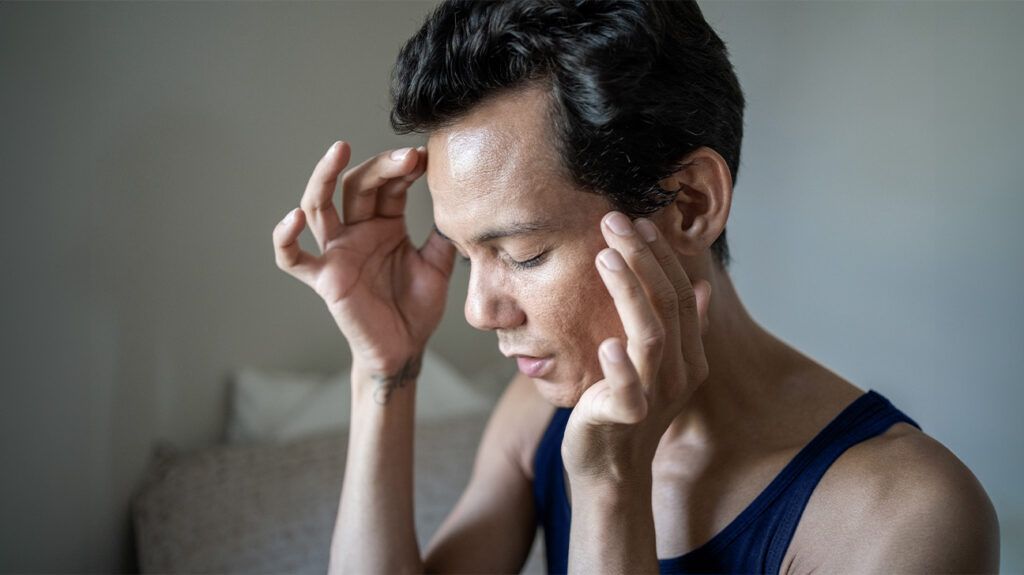High levels of progesterone may cause acne in some people. This is because it stimulates the sebaceous glands, which produce oil, or sebum. This can block pores, resulting in acne.
However, it is important to note that progesterone is just one of many factors that could lead to acne. Hormonal imbalances and fluctuations, the growth of certain bacteria on the skin, and other factors can also contribute.
In this article, we explore whether progesterone causes acne, the effects of other hormones on acne, and treatment options.

High progesterone can potentially cause acne. An older
An increase in oil on the skin can lead to clogged pores. The presence of certain types of bacteria on the skin, such as
Progesterone is one of several female sex hormones that support menstruation and pregnancy. In the right balance, progesterone can help keep the skin healthy. But when progesterone or other hormones are out of balance, this may worsen acne.
Yes, progesterone medications, such as progesterone-only forms of contraception,
Hormonal contraceptives that contain both progesterone and estrogen can sometimes help regulate hormonal fluctuations, potentially
However, it is important to know that the response varies in different people.
High progesterone does not always cause symptoms. Acne may be the only sign, and some people have no symptoms at all.
The side effects of taking progesterone medications can include:
- irregular periods or no periods
- breast tenderness
- headaches
- nausea
- increased hair growth
- unintentional weight gain
These signs alone are not conclusive proof of high progesterone levels, though. Many conditions could cause them. A diagnosis requires a thorough evaluation by a healthcare professional.
Progesterone is not the only hormone that can influence acne development. Other hormones that may cause acne include:
- Androgens: Androgens are male sex hormones, including testosterone. Females have small quantities of androgens in their bodies. Similarly to progesterone, elevated androgen levels can stimulate the sebaceous glands. People with polycystic ovary syndrome have
higher androgen levels than usual. - Insulin: Insulin is a hormone that regulates blood sugar levels. However, it also stimulates the growth and development of sebaceous glands and
increases androgen production from the ovaries and adrenal glands. This could explain why some people find certain foods trigger acne. For example, eating simple carbohydrates leads to the release of insulin. - Pituitary hormones: The pituitary gland in the brain is responsible for androgen regulation and the production of several hormones that influence sebum production.
- Steroids: Steroid hormones may increase acne by promoting the release of inflammatory substances.
- Estrogen: A moderate level of estrogen can
suppress sebum production and have a protective effect on the skin. However, low estrogen levels, especially in combination with higher progesterone or androgen levels,could lead to acne .
A doctor may diagnose acne via a physical examination of the skin. To try and identify a cause, they may also ask questions about a person’s:
- menstrual cycles
- medical or family history
- medications, if they are currently taking any
In some cases, a doctor might recommend a blood test to assess a person’s hormone levels. This could reveal excess progesterone or another imbalance, such as high androgens.
Hormonal acne treatment can look different from person to person. A doctor or dermatologist
- Topical treatments: A regular skin care routine consisting of a gentle cleanser, an acne treatment such as a retinoid or benzoyl peroxide, and a moisturizer that does not block pores may help reduce acne.
- Stopping or changing medications: If a person’s medications or contraception could be causing acne, a doctor may suggest changing the format or dosage they are taking or stopping it altogether. Only do this with the supervision of a doctor.
- Trying estrogen: Hormone replacement therapy (HRT) or contraceptives that contain estrogen may help balance hormones and reduce acne for some people. However, this is not a suitable option for everyone.
- Lifestyle modifications: A balanced diet, stress management, and stopping smoking may all help with adult acne.
- Anti-androgen medications: For people with PCOS, a doctor may prescribe medication such as
spironolactone to reduce high testosterone levels.
Treatments that help reduce the appearance of acne scars may also be beneficial for some people. This can include light therapy, laser therapy, skin peels, or microneedling.
Because the causes of acne can be complex, it is important to have the guidance of a healthcare professional when treating it.
Some medications may have side effects. For example, several over-the-counter and prescription acne treatments can make the skin
The link between hormones and acne is complex. High progesterone levels
A doctor or dermatologist can help you create a tailored plan to treat acne. This may include a combination of treatments such as medications, topical treatments, and changes in lifestyle.
